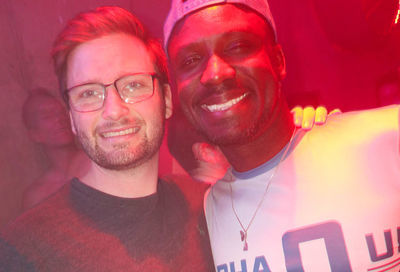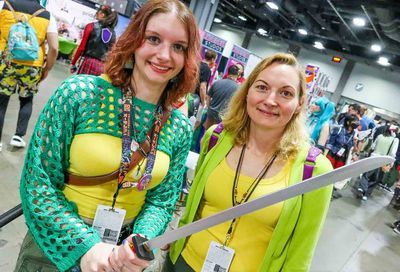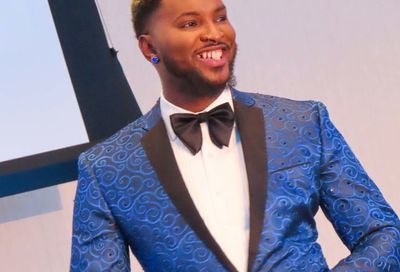Stirred to Action
Viciousness of recent anti-gay attacks spurs community reaction
Perhaps a picture is worth a thousand words. When it comes to motivating a community, a picture — far more than flow charts of crime statistics or bullet points in a report — may actually be invaluable. Add to that picture a compelling online essay, and you have the start of a community movement.
With a number of publicized attacks against local gay people in recent months, from Nathaniel Salerno’s attack on a Metro train in December to Michael Roike and Chris Burrell being beaten to the ground near the 14th and P Streets NW intersection in August, the viciousness Todd Metrokin suffered in Adams Morgan in July — written about on The New Gay blog by his friend Chris Farris in late August — may have been a tipping point.
”There are the anecdotal stories you hear from your friends,” says Pete Perry, a local gay man and longtime peace activist. ”Then I read about the attack in Adams Morgan and in front of Playbill [Café at 14th and P Streets].”

What Perry read, along with those photos of Metrokin’s injuries showing stitches running throughout his ear and a boot print on his face below swollen eyes, was the catalyst for him to turn the energy he’d been dedicating to opposing war and torture to his more immediate community. He got to work with David Mariner, acting executive director of The Center, the metro area’s GLBT community center, to organize a meeting to address hate crimes.
At the same time, Mark Hayes, another local gay man, was finding himself similarly fed up. While Perry is a Washington native, Hayes came to the District about five years ago, having lived in Boston and Raleigh, N.C. His experiences here, he says, indicate a level of entrenched homophobia he’s not experienced elsewhere.
”D.C. is very different,” says Hayes, recalling that he and three friends were recently taunted with shouts of ”faggot” by a passing Lincoln Navigator with Maryland plates as they neared Nellie’s, a gay sports bar, walking along 12th Street NW. ”Even though North Carolina has a reputation for not being as gay friendly, the big gay bar in Raleigh is right downtown. I’m not terrified, but I don’t have the level of safety that I felt in Boston.”
Hayes says he believes D.C. has a ”major problem with homophobia. I think it starts in schools and goes on up.”
Hayes, reacting independently for the most part, had been in touch, he says, with both Farris and another local man, Shea Van Horn. When they learned of Perry’s meeting at The Center, they combined their efforts with his.

That meeting, Monday evening, Sept. 8, brought 13 people together to discuss a grassroots response to the attacks. Among the small group, some already knew each other, if only recently. Farris and Van Horn were there, along with Zack Rosen, who is also associated with The New Gay, and Hayes. Metrokin was there, too, his injuries appearing healed, at least superficially. Perry sat near the head of the conference table, while Mariner conducted the meeting.
Two guests, Tom Donegan and Tracey Conaty, were invited by Mariner to share their perspectives, having been in a similar set of circumstances nearly two decades ago as key organizers of Gays and Lesbians Opposing Violence (GLOV), a grassroots organization that existed through the 1990s, also a response to violent crimes in the GLBT community.
For about an hour and a half, the group took nascent steps, discussing each attendee’s motivation for being there, perceptions of crime, thoughts on what the group should be doing, etc. There were calls to hold rallies or marches following a Take Back The Night model, or buy billboards showing same-sex affection, and to figure out exactly how the Metropolitan Police Department’s Gay and Lesbian Liaison Unit fits into the mix.
There was also a call for outreach to other corners of the local GLBT community. It was an understandable call, in that those gathered Sept. 8 were nearly all white men. In and of itself, that might not mean much — even if not representational of the District’s GLBT community — but some of the comments posted to Farris’ New Gay essay, ”Where is our anger?” exposed a mix of, at best, racial tension.
”If you think yuppie white boys in striped shirts are doing the beatings you are mistaken,” read one anonymous post.
Followed by, ”If your racist sensibilities were offended, rest assured that ‘suburban’ doesn’t necessarily mean white or yuppie around here.”
And, ”It is not race baiting to describe identified suspects and assailants, like the six black guys who, in fact, attacked three white gays in Adams Morgan. Grow a pair.”
While most comments expressed shock, anger or concern for Metrokin, or asked what the community might do to respond, there was enough friction to demand attention. Monday evening, Mariner volunteered to begin outreach efforts.
Sterling Washington, part of the leadership of the D.C. Coalition of Black GLBT Men and Women, is a target of that outreach. Reading the responses to Farris’ essay, Washington does not seem particularly troubled and adds that either he or D.C. Coalition President Brian Watson, who also works for Transgender Health Empowerment (THE), will definitely be attending this new group’s next meeting.
”The whole racial breakdown of it is very much an oversimplification,” says Washington, an African American, also mentioning a Sept. 7 attack near Eighth and N Streets NW that has left one gay black man on life support. The attack has initially been listed as a hate crime, though it remains under investigation.
”If you can objectify people, it’s easier to mug them. I think a lot of that goes back to what’s not being taught in schools about acceptance and tolerance. You would think in a city like this, that wouldn’t be an issue. It makes you think the perpetrators grew up in homes where homophobia is acceptable.”
Washington also suggested that self-defense pepper spray, particular varieties of which are legal in the District if registered with the MPD, might be in order.
Along with the D.C. Coalition, groups mentioned at the Monday meeting to be included in outreach efforts are THE, Asian Pacific Islander Queer Sisters, Asian Queers United for Action, the D.C. Trans Coalition, the Gertrude Stein Democratic Club, the Latino GLBT History Project and the Sexual Minority Youth Assistance League.
While folks at the meeting were not overly critical of the job the GLLU has done, the MPD in general took minor criticism for slow response times, and strong criticism for behavior that could be characterized as condescending at best.
How much more the police might be able to do has also been countered by the question of how much more the community might — or might not — want them to do.
On one hand, considering the GLLU’s role as the MPD liaison to and advocate for the GLBT community — though ultimately answerable to the police chief/mayor’s office — the GLLU’s supervisor, Officer Joe Morquecho, cited an interesting statistic at a town-hall meeting in April, pointing to the GLLU being assigned 555 calls in 2006. Of those, he said, 75 percent were domestic-disturbance calls, creating a community-driven drain on GLLU resources.
Adds Lt. Brett Parson, former head of the GLLU and now responsible for all MPD liaison units: ”I think you’ve got people wishing they could get the same personalized
service [from MPD] that they get with the GLLU, and that’s just impossible. The GLLU can’t investigate every crime that occurs. They’re good, but not that good. They
can only assist. If I were the victim of a crime, I’d want to go where I’m comfortable, but the GLLU are liaisons.”
Of increased police presence to deter attacks, says Hayes, ”Fundamentally, unless we’re going to turn into a police state, they can’t be on every block every day.”
Conaty strikes a similar chord, saying that, while she sees no relation between the end of the initial GLOV group and the start of the GLLU in 2000, the community cannot depend solely on the GLLU.
”We’d advocated for [the GLLU],” Conaty’s says of GLOV’s efforts in the ’90s. ”There was a sense of personal pride that it happened, but never a sense that it was a panacea that would solve all of our problems.
”The GLLU will operate best when there’s a community watchdog group it has to work with. It’s the same with all institutions. That’s why we have community groups. The GLLU has a responsibility, but so does our community to be visible and to advocate.”
Whatever direction this new effort takes, while already co-opting the GLOV moniker, it’s evident, at least for now, that there is a mood in the District that recent attacks on gay people have reached a point that has motivated corners of the community to greater action.
Perry, who with Farris met last week with Morqeucho, emphasizes that this new group will likely work closely with the GLLU, a move Parson says he strongly supports.
Beyond that, Perry offered a statement, the essence of which has been repeated by those involved in the new effort: ”I don’t want to be afraid any longer. I don’t want the GLBT community to say, ‘We’re afraid. We have to change our patterns.”’
Similarly, says Hayes, ”We are here in D.C. We are here like everyone else. We shouldn’t feel guilty for living here. If a guy and girl walk down the street in Shaw holding hands, gay people should, too. We’re not going to feel safe doing that unless we start doing that. Even if it’s antagonistic, I think it’s necessary.”
The next GLOV-GLBT Anti-Violence Group meeting is Monday, Sept. 22, from 7:30 to 9 p.m. at 1101 New York Ave. NW. For more information, visit The Center online at www.thedccenter.org.
Support Metro Weekly’s Journalism
These are challenging times for news organizations. And yet it’s crucial we stay active and provide vital resources and information to both our local readers and the world. So won’t you please take a moment and consider supporting Metro Weekly with a membership? For as little as $5 a month, you can help ensure Metro Weekly magazine and MetroWeekly.com remain free, viable resources as we provide the best, most diverse, culturally-resonant LGBTQ coverage in both the D.C. region and around the world. Memberships come with exclusive perks and discounts, your own personal digital delivery of each week’s magazine (and an archive), access to our Member's Lounge when it launches this fall, and exclusive members-only items like Metro Weekly Membership Mugs and Tote Bags! Check out all our membership levels here and please join us today!






















